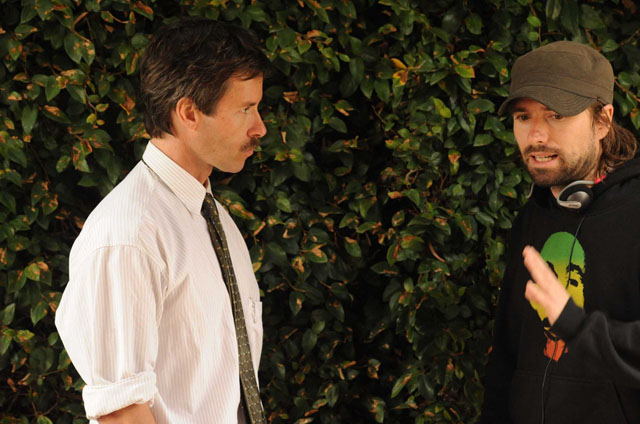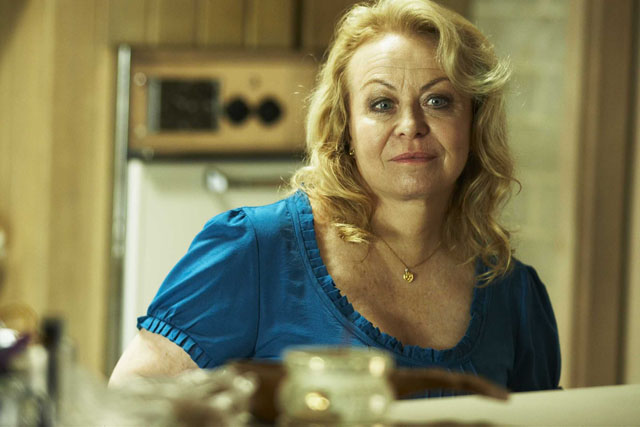CHICAGO – In anticipation of the scariest week of the year, HollywoodChicago.com launches its 2024 Movie Gifts series, which will suggest DVDs and collections for holiday giving.
Interview: Director David Michôd Explores His ‘Animal Kingdom’
CHICAGO – The gangster movie gets a nice Freudian twist in director David Michôd’s new film, “Animal Kingdom.” This Australian import focuses on a family of bank robbers whose mother is the glue that holds their criminality together. Guy Pearce (”Memento,” “The Hurt Locker”) lends his talent as Leckie, a pursuing police officer.
Working from his own screenplay, Michôd weaves a tale of damaged family values and the desperate sociopaths it produces. Whenever anybody attempts to “do the right thing” in his narrative, there is a punishment doled out. Pearce’s pursuant police officer, for example, must deal with a court system that is a sucker for a well-paid lawyer.
 Photo Credit: Tony Mott for © Sony Pictures Classic |
Animal Kingdom was recognized by receiving the Grand Jury Prize for Dramatic World Cinema at this year’s Sundance Film Festival. HollywoodChicago recently spoke to director David Michôd about all aspects of his fascinating film.
HollywoodChicago.com: I’ve described this film as ‘Goodfellas’ meets ‘Swiss Family Robinson’ meets the character Mother from the ‘Manchurian Candidate.’ What was your inspiration for the screenplay and how did it evolve from the initial idea?
David Michôd: The initial inspiration came from me reading about a particular period in Melbourne’s criminal history, especially in the 1980s, plus the decline of armed robbery as a serious, lucrative criminal issue. And about the antagonism that existed between these gangs of armed robbers and a particular hardened core of the Melbourne police.
HC: How did you turn that over into a family dynamic?
DM: There was a singular event that took place in Melbourne in the late 1980s, which was a cold-blooded and totally random revenge killing of two young cops, in response to the Melbourne Police Armed Robbery Squad having shot dead an alleged armed robber the day before. There was something about that being so chilling to me that almost immediately made start imagining a grand and menacing crime film, which I knew on some level would also draw from some of the well-documented criminal family structures.
There are criminal families and the structures of those families that are so notorious in Melbourne. There are a number of women, for instance, who are quite infamous and publicly identifiable who are mothers of notorious families. They don’t function necessarily as matriarchs, in the mafia sense, but are nonetheless powerful and compelling figures. They are simply the mothers of dangerous children, who take on a life and almost celebrity of their own.
HC: The title Animal Kingdom is intriguing. Are you saying that through all of our civilization we’re still animals below the surface or are you commenting on the criminal attitudes of the Cody family?
DM: A little bit of both. I don’t think you can deny that underneath all of our finery and polish, that there is some pretty basic and very primal stuff going on. At the same time, the title for me is largely reflective on what I hoped would be a grand ecosystem of all kinds of different characters.
There is a Darwinian thing at play, obviously, within the family. But yet I really wanted it to be suggestive of an entire jungle of characters, of innocent plant eaters who have no idea there is a tiger behind the bush. And the ways in which all of the creatures within this ecosystem interact.
HC: The legal system plays a large role in ‘Animal Kingdom.’ What is your attitude on how the law is designed. Where does that thin line between anarchy and civilization begin to show its cracks?
DM: Well I think in a sense what you’re looking at is the ways in which people form for themselves moral codes in different moral environments. You have what looks to be throughout the film people who are suppose to be upholding the law or controlling moral ideas of that particular society and yet they are people who have grown up in a morally murky world. They have trouble interpreting those moral codes in a way that they were designed to be interpreted.
HC: We look toward the police to be our heroes and protectors, yet we forget sometimes that they are human. How does this humanity play into your scenario regarding corrupt cops?
DM: One thing I wanted to do in the film – and this is true about the cops and the crooks – was to make the characters human. One of the problems I have with cops and robbers on television is how inauthentic they feel as people. I wanted to reflect the way the police force, any police force, is simply a microcosm of society.
You have good people who have a clear sense of what they were employed to do, and do it with great vigor, some people will do it with too much vigor. Other people see that the power of being in the police as something to be exploited. And there are others who stumble into the job without giving it a lot of thought and are forced to deal with the baggage that comes with that. What I wanted to do was create a sense of a police force full of human beings.
 Photo Credit: John Tsiavis for © Sony Pictures Classic |
HC: Jacki Weaver is amazing as Mother Janine. What did she understand about the character that other actresses you auditioned didn’t?
DM: I didn’t audition anybody. I wrote the character for Jacki. I actually offered it to her six years ago, thinking at that time I’d be making the movie any day. [laughs] On the page the character might seem to require a villainous or grizzled performance. I had a very clear sense in my head of a character that would be deceptively benign, and creep up on the audience over the course of the film. Whilst there are a number of great Australian actresses, no one does that disingenuous delightfulness as well as Jacki Weaver can, it’s quite beguiling to be around. I also liked bringing the whole weight of her life and professional experience to this character, who is almost girlish but very knowing.
HC: The dynamics of family is as different as a fingerprint with every single group you encounter. What, besides their bonding in crime, do you think defines the Cody family dynamic?
DM: Their mother. In a sense, it is not an unconventional film about crime and family. Yet this is not the kind of structured, organized criminal family that we’re used to seeing on film and television. It is a very loose, dysfunctional family that wouldn’t be hanging around together if there wasn’t the glue that is Jacki’s character. And she holds this family together for very selfish reasons, it’s all about her sense of self that is born of being associated with this brood of powerful and dangerous young men.
But what you are looking at is possibly sociopathic dysfunction. Her children probably have all been born of different fathers. The fathers were neglectful, if not abusive, both toward the kids and to her as well. So she has an incredibly warped sense of her relationship to men, which fades into the relationships with her sons. You can only assume, given the general criminal world that then exist in, that only bad things will come of it.
HC: Guy Pearce gives Leckie a flawed but heroic skin. How did he prepare for the role and what kind of director/actor interchange did you have with him during the shoot?
DM: He’s intense, as in he’s serious and works hard. He is meticulous. But he is a lovely guy, too, and I feel really quite lucky to have had an experience with the closest thing we have in this film to a movie star, and to have that experience with someone like Guy. As soon as he gets a sense he can trust you as a director, which is what rehearsal for him I suspect is all about, he’s completely giving, accommodating and collaborative.
It felt to me like a character I hadn’t seen him play before. I think the reason he responded to the script so quickly is that it felt that way to him.
Photo credit: Patrick McDonald for HollywoodChicago.com |
HC: How do you work out your shot design and sequencing? Do you leave room for improvising that plan when you’re on the set?
DM: I don’t storyboard. I used to storyboard, but I would get bored after only about five frames. [laughs] What I figured out early on is that I like to shot lists and floor plans. Literally having a map, a very loose architectural drawing of the location we’re shooting in. And mapping out camera set-ups with arrows.
But you always need to be prepared for improvisation, because the blocking will change, something the actors bring on the day will change and the nature of the coverage can change. At the end of the day sometimes I’d need to change five shots into two, just because we had run out of time.
HC: What was your background that led you to filmmaking? What intrigued you about the movies when you were a kid?
DM: I loved movies when I was a kid, but it was a basic ‘kid’s love’ of films like ‘Star Wars,’ ‘Jaws’ and I also loved Richard Donner’s ‘Superman.’ But I had no sense back then of wanting to be a filmmaker. It wasn’t until my early to mid-twenties when I graduated from college and wondered what I was going to do with my life. I just decided to take a stab at film school and see how it turned out. Thank god it worked out. I don’t remember being that passionate about being a filmmaker. If I hadn’t got in I probably would have done something else.
HC: Finally, Film Festivals like Sundance has become more and more important to emerging filmmakers. What will your Grand Jury Prize and subsequent release of the film do for you as far as projects you want to take on?
DM: Hopefully the reception that the film received will allow me to make another film, but to do with a certain degree of freedom and with something close to the resources I might need to pull it off.
It was one the things that was so important to me when I was making Animal Kingdom, that caused me so much anxiety, was the genuine belief that in this day and age the film had to able to stick it’s ‘head’ above the crowd. That it wouldn’t be good enough that it simply be ‘good.’ It had to make an impact of some kind. That is reflective on how tight the business is these days, and how crowded the marketplace is.
I don’t think filmmakers have the luxury, as they did maybe thirty years ago, to make a couple of sloppy first films before they hit their stride. What I wanted to do was make sure I made some kind of substantial impact with my first film. So whatever form my career might take, it would take that form quickly and substantially. Hopefully something along these lines come from the recognition at Sundance.
 | By PATRICK McDONALD |



very nice
This beautiful and informative article, thank you very much. Use this page to your friend told you. I am constantly followed. To receive more information about this topic the following internet sites can follow.
toplum